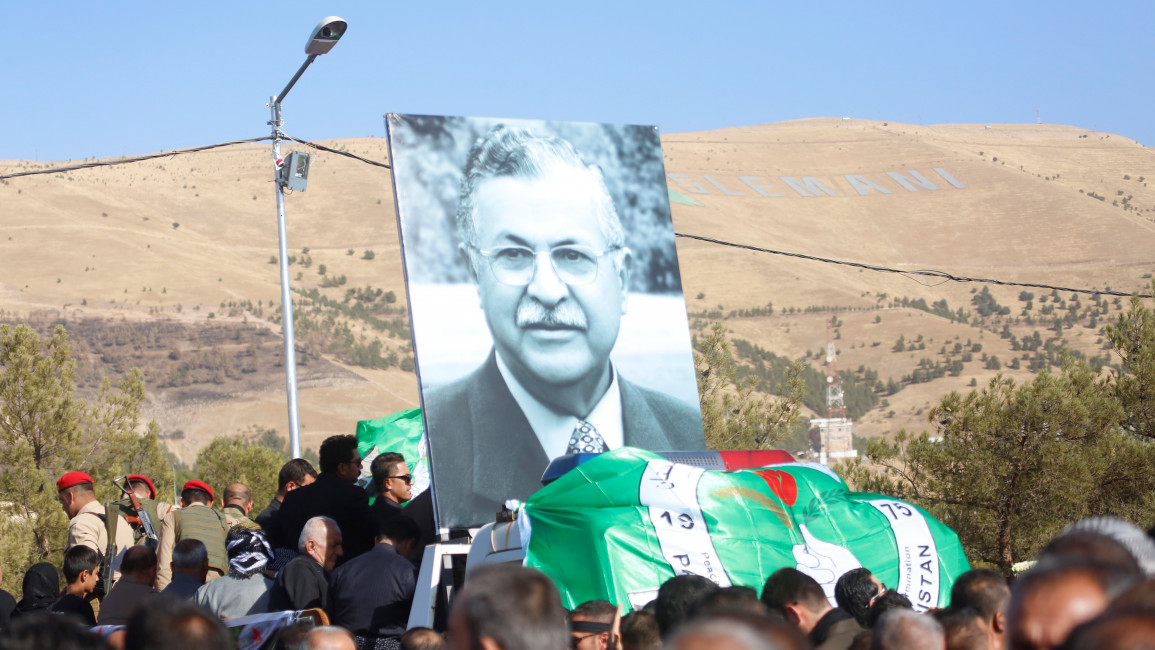Kurds seek safeguards for their rights from Iraq’s next gov't: PUK spokesperson
As Iraq's political deadlock approaches its first year, Iran-backed Shia parties with the main Sunni and Kurdish parties have formed a "Running the State Coalition (RSC)" to elect a president and form a consensus government.
The New Arab interviewed Dr Soran Jamal Taher, spokesperson for the Patriotic Union of Kurdistan (PUK), one of the main Kurdish ruling parties in the Iraqi Kurdistan region, regarding the coalition's details and goals.
The RSC has been formally signed on 25 September, the spokesman noted, among the Coordination Framework (CF), which includes the main Shia parties, the Sunni Sovereignty Alliance composed of the Taqqadum (Progressive) Party of Parliament Speaker Mohammed al-Halbousi and Khamis al-Khanjar's Azm Alliance, the Kurdistan Democratic Party (KDP), PUK and the Babylon parliamentary bloc Christian group.
"The coalition's most important aim is to write a successive programme for Iraq's upcoming government, and the same plan will also be used as the coalition's agenda," Jamal Taher told TNA. "Another aim is to gradually resume the parliament's sessions, elect parliament's first deputy speaker, the Iraqi president and the candidate for the prime minister."
Iraq's political crisis began after the country conducted early elections on 10 October 2021, in which Moqtada al-Sadr's bloc won a majority with 73 seats. Sadr tried to form a 'national majority' government with several Sunni and Kurdish blocs, mobilising against pro-Iran Shia blocs organised under CF.
Frustrated in his efforts to fulfil his promise to his supporters, however, Sadr ordered lawmakers from his bloc to resign, which all his MPs did on 12 June. The CF replaced Sadr's MPs with their own, becoming the biggest bloc in the Iraqi parliament. They vowed to form a consensus government that would include all the Sunni and Kurdish blocs.
The PUK and the KDP, two rival parties in the Iraqi Kurdistan Region (IKR), have been at odds on nominating a candidate for Iraq's presidency, which is the share of the Kurds in the proportional (Muhasasa) representation system among Iraq's Sunni, Shia, Kurdish and other ethno-sectarian groups since the US-led invasion of the country in 2003. As all Iraqi presidents, including the incumbent Barham Salih, are from the PUK, the KDP wants to elect Rebar Ahmed to the presidency. Salih is running for a second term.
The KDP and the Sovereignty Alliance were former Sadr allies.
"We as Kurds [PUK and KDP] hoped for a joint negotiation delegation to the RSC, however, this could not be followed. As the PUK, our main condition for entering Iraq's upcoming government is the implementation of all constitutional rights for the Kurdish people," said PUK’s spokesperson. "Mainly the IKR gets its share from Iraq's federal budget far away from political issues, halting the Arabisation process in areas outside the Kurdistan Regional Government (KRG) administration since we consider those areas as a place and city of coexistence."
"Other key issues are passing an oil and gas law for Iraq, the implementation of Article 140 of Iraq's constitution, Kurdish peshmerga forces should receive their salaries from the federal expenses as part of Iraq's defence system, and the security of militarised provinces should be handed over to local police," he added.
Article 140 outlines measures for identifying the fate of constitutionally disputed areas, including the oil-rich city of Kirkuk, between the Iraqi federal government and the KRG. These measures include normalisation, conducting a census and holding a vote so that people of those areas remain under the administration of the Iraqi government or join the Kurdish region north of the country.
Taher also indicated that although the two Kurdish parties had several meetings, no agreement to settle their differences regarding the candidate for Iraq's presidency has been reached.
He stressed that Salih is the PUK's formal candidate for the run for Iraq's presidency, hoping all Iraqi and Kurdish MPs vote for him.
The CF in July nominated Mohammed Shia' al-Sudani as the new Iraqi prime minister.
"We have not interfered in who is nominated to be Iraq's PM but we insist that he should be a PM for all of Iraq and not to challenge the IKR in particular; currently, there are discussions among RSC on writing a program for Iraq's future government, we will try to guarantee our rights within this plan," the spokesperson clarified.
Salih Mohammad al-Iraqi, a shadowy figure on Twitter believed to be a senior adviser to Muqtada Al-Sadr, on 28 September threatened all the political sides allied under RSC with dire consequences if they form a government without Sadr's consent.
Ex-Iraqi president and former secretary general of PUK, Jalal Talabani, passed away on 3 October 2017 in Germany, following a long period of treatment after a stroke in 2012.
Talabani, 83, was Iraq's president from 2005 to 2014 and a key figure in Kurdish politics.

![Dr Soran Jamal Taher, spokesperson for the Patriotic Union of Kurdistan (PUK). [PUK]](/sites/default/files/styles/large_1_1/public/2022-10/MicrosoftTeams-image%20%281%29.png?h=e2567735&itok=rLYzfFgK)


